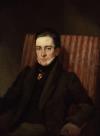Biography
An editor, publisher, poet, and humorist, Thomas Hood was born in London, the son of a bookseller. After his father died in 1811, Hood worked in a countinghouse until an illness forced him to move to Dundee, Scotland, to recover with relatives. In 1818 he returned to London to work as an engraver.
In 1824 Hood married Jane Reynolds and collaborated on Odes and Addresses with his brother-in-law, J.H. Reynolds. Though he was known for his light verse and puns, Hood also depicted the working conditions of the poor in poems such as “Song of the Shirt,” about a seamstress, and “Song of the Labourer.” His publications include Whims and Oddities (1826 and 1827), National Tales (1827), a collection of stories, and The Plea of the Midsummer Fairies (1827). In the 1830s he traveled to continental Europe and lived with his family in Belgium, which provided inspiration for Up the Rhine (1840). Suffering from ill health and troubled finances, he received a grant from the Royal Literary Fund in 1841.
Hood was associated with a number of magazines throughout his life: the London Magazine and New Monthly Magazine as an editor, and the Athenaeum as a contributor. He also published a magazine called Hood’s Own, or, Laughter from Year to Year and released the Comic Annual series. As a member of the London literary scene, he was familiar with Hartley Coleridge, Thomas De Quincy, William Hazlitt, Charles Lamb, and William Wordsworth.






